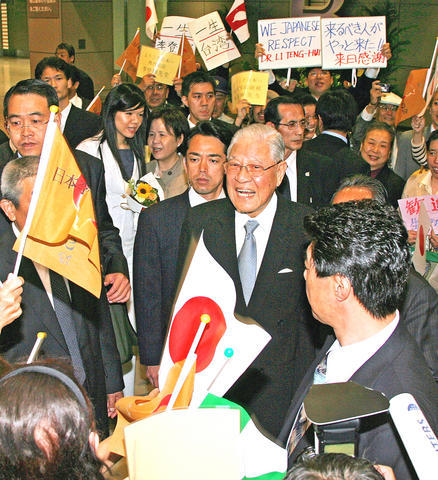Former president Lee Teng-hui (
Lee's elder brother served in the Japanese navy and died while on duty in February 1945 in the Philippines.
"I have not yet decided on the timing, but since I am here, I think that I should go see my brother," Lee told reporters on his arrival at Narita airport near Tokyo.

PHOTO: AFP
"I will meet my brother for the first time in 60 years," Lee said.
Lee, accompanied by his wife Tseng Wen-hui (
Speaking to Japanese reporters on the flight from Taipei, the 84-year-old former leader said he wanted to pray at the Yasukuni shrine because he did not know how much longer he would live.
The Yasukuni shrine honors 2.5 million war dead, including colonial subjects who fought for Japan. Visits to the shrine by Japanese leaders have long been a subject of dispute with China and South Korea which view the shrine as a symbol of Japan's militarist past. Most controversially, the Shinto shrine lists the names of 14 top war criminals from World War II.
Based on the itinerary released by Lee's office, the former president will spend the first three days visiting Tokyo, culminating in a ceremony wherein he will be presented with the first Shinpei Goto Prize by Tokyo's Shinpei Goto Society tomorrow.
The prize was established to mark the 150th anniversary of the birth of the late Japanese colonial administrator Shinpei Goto and is awarded to people who have contributed to national or regional development.
From Saturday to Tuesday, Lee will make an "oku no hosomichi" tour covering the prefectures of Miyagi, Yamagata, Iwate, Akita and Gunma, retracing a journey made by the Japanese poet Basho in 1689 on which his famous work Oku no Hosomichi, or The Narrow Road to Oku was written.
Lee is scheduled to visit Akita International University next Wednesday, where he will give a speech on Japanese education and hold a seminar with Taiwanese students. He will also visit Takushoku University in Tokyo to discuss the global outlook this year. He will wrap up his visit next Saturday.

Taiwan is stepping up plans to create self-sufficient supply chains for combat drones and increase foreign orders from the US to counter China’s numerical superiority, a defense official said on Saturday. Commenting on condition of anonymity, the official said the nation’s armed forces are in agreement with US Admiral Samuel Paparo’s assessment that Taiwan’s military must be prepared to turn the nation’s waters into a “hellscape” for the Chinese People’s Liberation Army (PLA). Paparo, the commander of the US Indo-Pacific Command, reiterated the concept during a Congressional hearing in Washington on Wednesday. He first coined the term in a security conference last

A magnitude 4.3 earthquake struck eastern Taiwan's Hualien County at 8:31am today, according to the Central Weather Administration (CWA). The epicenter of the temblor was located in Hualien County, about 70.3 kilometers south southwest of Hualien County Hall, at a depth of 23.2km, according to the administration. There were no immediate reports of damage resulting from the quake. The earthquake's intensity, which gauges the actual effect of a temblor, was highest in Taitung County, where it measured 3 on Taiwan's 7-tier intensity scale. The quake also measured an intensity of 2 in Hualien and Nantou counties, the CWA said.

The Overseas Community Affairs Council (OCAC) yesterday announced a fundraising campaign to support survivors of the magnitude 7.7 earthquake that struck Myanmar on March 28, with two prayer events scheduled in Taipei and Taichung later this week. “While initial rescue operations have concluded [in Myanmar], many survivors are now facing increasingly difficult living conditions,” OCAC Minister Hsu Chia-ching (徐佳青) told a news conference in Taipei. The fundraising campaign, which runs through May 31, is focused on supporting the reconstruction of damaged overseas compatriot schools, assisting students from Myanmar in Taiwan, and providing essential items, such as drinking water, food and medical supplies,

New Party Deputy Secretary-General You Chih-pin (游智彬) this morning went to the National Immigration Agency (NIA) to “turn himself in” after being notified that he had failed to provide proof of having renounced his Chinese household registration. He was one of more than 10,000 naturalized Taiwanese citizens from China who were informed by the NIA that their Taiwanese citizenship might be revoked if they fail to provide the proof in three months, people familiar with the matter said. You said he has proof that he had renounced his Chinese household registration and demanded the NIA provide proof that he still had Chinese